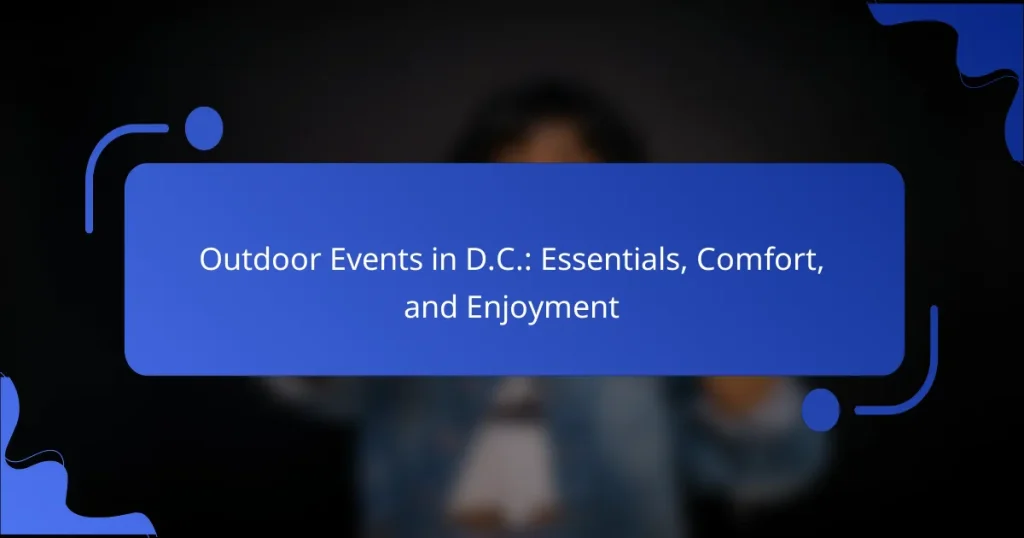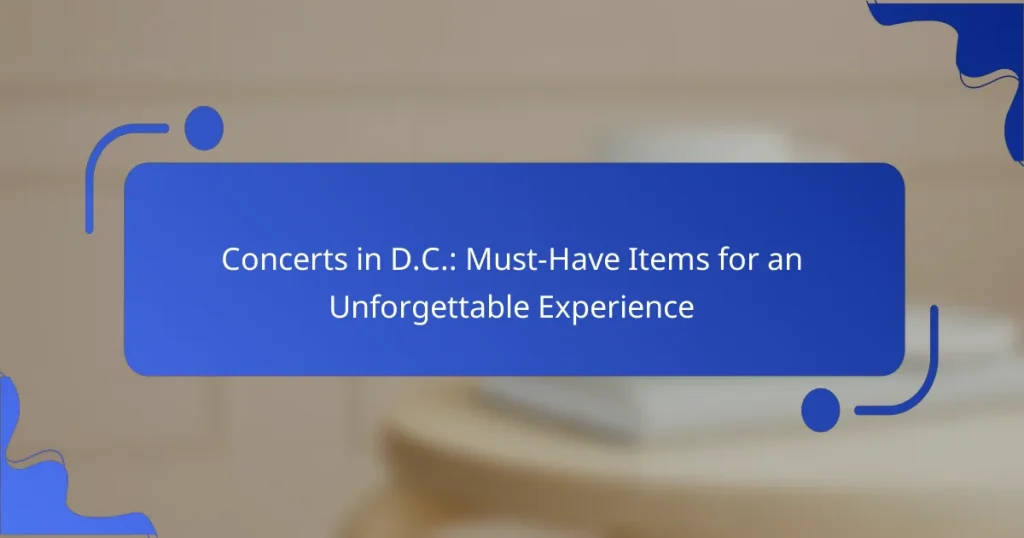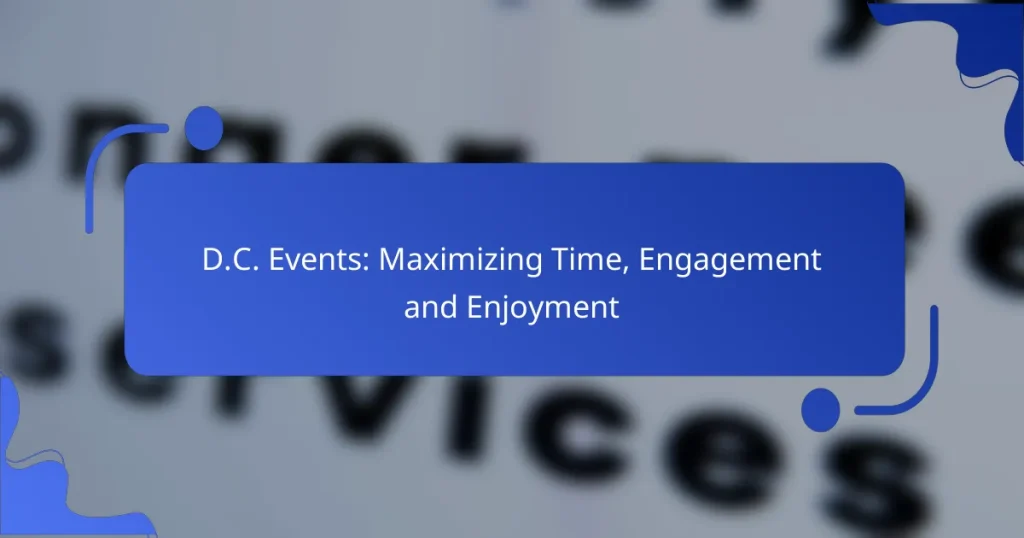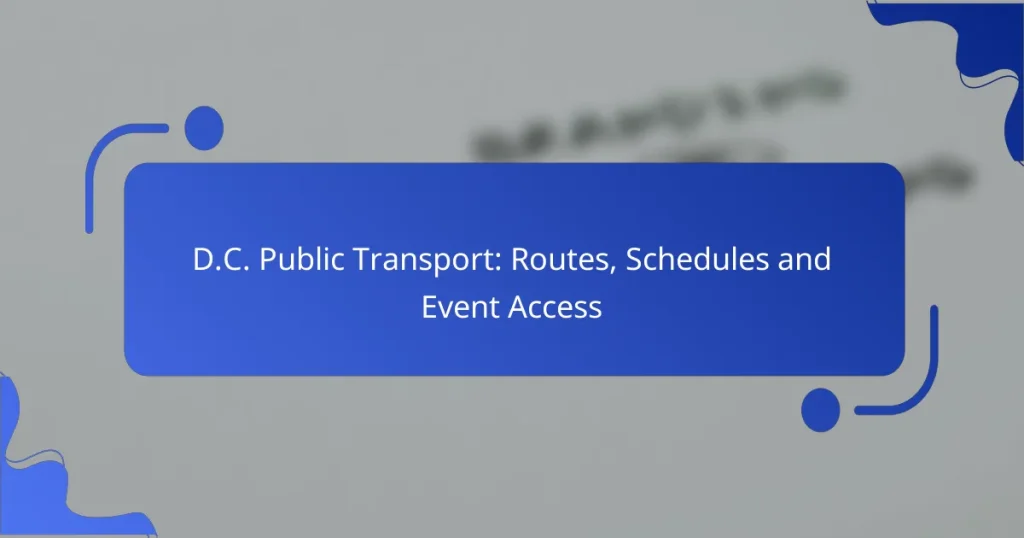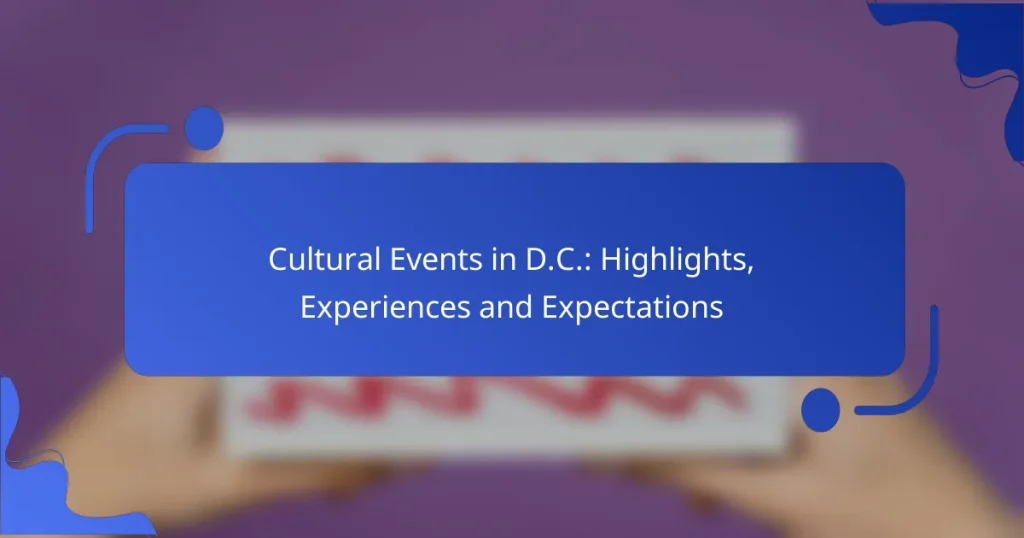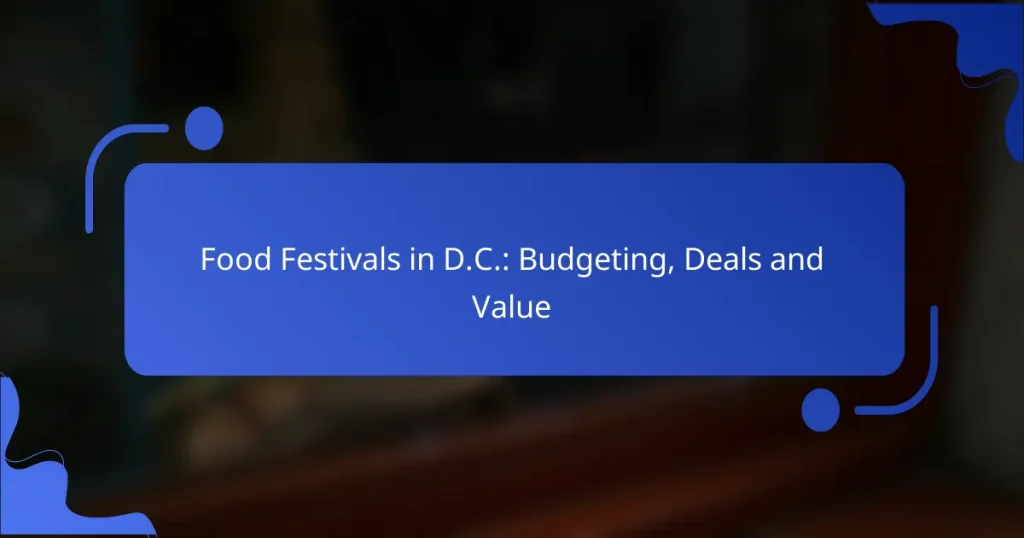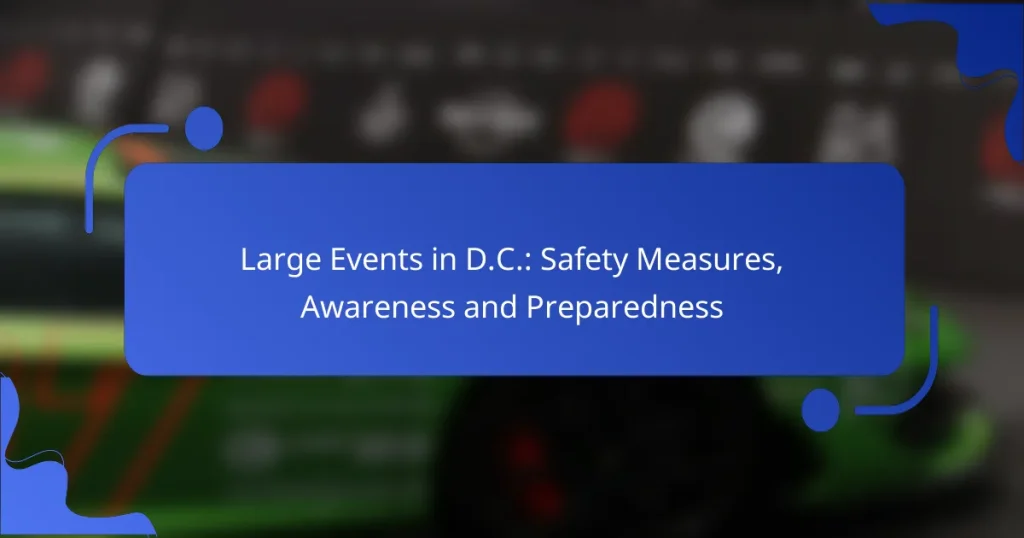Washington, D.C. is a vibrant hub for events year-round, offering a rich tapestry of cultural festivals, literary gatherings, and more. With numerous resources available online and offline, discovering the perfect event is easy and accessible for everyone. Whether you’re interested in conferences, exhibitions, or performances, the city’s diverse venues provide unique settings to enhance your experience.
Concerts in D.C.: Must-Have Items for an Unforgettable Experience
D.C. Events: Maximizing Time, Engagement and Enjoyment
D.C. Public Transport: Routes, Schedules and Event Access
Cultural Events in D.C.: Highlights, Experiences and Expectations
Food Festivals in D.C.: Budgeting, Deals and Value
Large Events in D.C.: Safety Measures, Awareness and Preparedness
What events can I attend in Washington, D.C.?
Washington, D.C. hosts a variety of events throughout the year, catering to diverse interests. From cultural festivals to literary gatherings, there is something for everyone to enjoy.
Annual Cherry Blossom Festival
The Annual Cherry Blossom Festival celebrates the blooming of cherry trees gifted by Japan. This event typically occurs in late March to early April and features a range of activities including parades, cultural performances, and food vendors.
Visitors can enjoy the stunning scenery along the Tidal Basin while participating in traditional Japanese arts and crafts. Arriving early is advisable, as the festival attracts large crowds, especially on weekends.
Smithsonian Folklife Festival
The Smithsonian Folklife Festival takes place every summer on the National Mall, showcasing cultural traditions from around the world. This event usually spans ten days and includes live music, crafts, and culinary demonstrations.
Admission is free, making it accessible to all. Attendees can engage with artisans and learn about different cultures through hands-on activities and performances.
National Book Festival
The National Book Festival is an annual event that celebrates literature and reading, typically held in late summer. It features author signings, panel discussions, and activities for children and adults alike.
This festival is a great opportunity to meet authors and discover new books. It’s advisable to check the schedule in advance to plan which sessions to attend, as popular authors often draw large audiences.
Washington D.C. International Film Festival
The Washington D.C. International Film Festival showcases independent films from around the globe, usually occurring in the spring. This festival includes screenings, panel discussions, and opportunities to meet filmmakers.
Tickets can vary in price, so it’s wise to purchase them early for popular screenings. Attendees can gain insights into the filmmaking process and enjoy a diverse range of cinematic styles.
National Mall Concerts
National Mall Concerts feature a variety of musical performances throughout the summer, often free of charge. These concerts include genres from classical to contemporary and attract both locals and tourists.
Arriving early is recommended for the best viewing spots, especially for popular acts. Bring a blanket and picnic to enjoy a relaxing evening under the stars while listening to live music.
How do I find events in Washington, D.C.?
Finding events in Washington, D.C. is straightforward with various resources available online and offline. Utilize local websites, social media, and community boards to stay updated on upcoming activities and gatherings.
Visit Washington.org for event listings
Washington.org is the official tourism website for the city and offers a comprehensive calendar of events. You can find everything from festivals and concerts to exhibitions and sports events. The site is regularly updated, making it a reliable source for planning your visit.
Additionally, the website often highlights special events and seasonal activities, helping you discover unique experiences that may not be widely advertised elsewhere.
Check local event calendars
Many local newspapers and community organizations maintain event calendars that list happenings in Washington, D.C. Websites like The Washington Post and local blogs provide curated lists of events, often categorized by type or date. This can help you find specific interests such as art shows, food festivals, or lectures.
Be sure to check these calendars frequently, as events can be added or changed rapidly, especially in a vibrant city like D.C.
Follow social media pages of venues
Many venues in Washington, D.C. actively use social media to promote their events. Following theaters, museums, and concert halls on platforms like Facebook, Instagram, and Twitter can keep you informed about upcoming shows and ticket sales. Venues often share exclusive promotions or last-minute deals through their social channels.
Engaging with these pages can also provide insights into the atmosphere of events and help you connect with other attendees, enhancing your overall experience.
What are the best venues for events in Washington, D.C.?
The best venues for events in Washington, D.C. offer a mix of capacity, amenities, and unique settings. Key factors to consider include location, accessibility, and the type of event being hosted, whether it’s a conference, exhibition, or performance.
Walter E. Washington Convention Center
The Walter E. Washington Convention Center is a premier location for large-scale events, featuring over 2.3 million square feet of space. It accommodates conventions, trade shows, and corporate meetings, making it a versatile choice for various gatherings.
When planning an event here, consider the center’s advanced technology and services, including high-speed internet and on-site catering. Booking well in advance is advisable, especially for popular dates.
National Gallery of Art
The National Gallery of Art provides a stunning backdrop for events, combining art and culture in a unique setting. Its East and West Buildings offer various spaces for receptions, dinners, and private events, all surrounded by world-class art collections.
Utilizing this venue requires coordination with museum staff to ensure compliance with regulations regarding art preservation. Events can be scheduled during or after museum hours, allowing for a memorable experience in a historic environment.
The Kennedy Center
The Kennedy Center is renowned for its performing arts venues, making it an ideal location for concerts, theater productions, and corporate events. The center features multiple performance spaces, including the Concert Hall and the Opera House, each with exceptional acoustics.
When hosting an event here, consider the availability of pre-event receptions and the option to include performances as part of the experience. Early booking is essential due to high demand, especially for popular shows.
Capitol One Arena
Capitol One Arena is a multi-purpose venue that hosts sports events, concerts, and large gatherings. With a capacity of over 20,000, it is suitable for both intimate and large-scale events, providing a vibrant atmosphere in the heart of D.C.
When planning an event at this arena, consider the logistics of parking and public transportation access. Additionally, be aware of the arena’s schedule, as it can affect availability for private events.
What are the ticket options for events in Washington, D.C.?
In Washington, D.C., attendees have several ticket options for events, including online platforms, box office purchases, and discount services. Each method offers unique advantages and considerations, making it important to choose the one that best fits your needs.
Online ticketing platforms like Ticketmaster
Online ticketing platforms, such as Ticketmaster, provide a convenient way to purchase tickets for various events in Washington, D.C. Users can browse events, select their seats, and complete transactions from the comfort of their homes.
When using these platforms, be aware of service fees that can add to the ticket price. It’s also wise to check for presale opportunities or promotional codes that may reduce costs.
Box office purchases
Buying tickets directly at the box office can be a great option for those who prefer in-person transactions. This method often allows you to avoid online fees and provides immediate access to tickets.
However, box office hours may vary, and popular events can sell out quickly. Arriving early is advisable, especially for high-demand shows, to secure your tickets.
Discount ticket services
Discount ticket services, such as Today Tix or Goldstar, offer reduced prices for last-minute tickets or less popular events in Washington, D.C. These platforms can be an excellent way to experience live events without breaking the bank.
Keep in mind that availability may be limited, and you might not always get your first choice of event or seating. Always read the terms and conditions to understand any restrictions or fees associated with discounted tickets.
What are the transportation options for attending events in Washington, D.C.?
Washington, D.C. offers various transportation options for attendees of events, making it easy to navigate the city. The most common methods include the Metro system, ride-sharing services, and public bus services, each with its own advantages and considerations.
Metro system
The Metro system is a convenient and efficient way to travel around Washington, D.C. It operates six lines that connect key areas, including event venues, making it a popular choice for attendees. Trains typically run every few minutes during peak hours, and fares range from a few dollars to around $6, depending on the distance traveled.
When using the Metro, consider purchasing a SmarTrip card for easy access and discounted fares. Be mindful of peak travel times, as trains can become crowded, especially during major events.
Ride-sharing services like Uber and Lyft
Ride-sharing services such as Uber and Lyft provide flexible transportation options for event attendees. These services allow you to request a ride from your location to the event venue, with prices varying based on distance and demand. During busy times, fares may surge, so it’s wise to check the app for estimated costs before confirming your ride.
While convenient, be aware of potential wait times, especially in high-traffic areas. Designating a clear pick-up location can help streamline the process after the event.
Public bus services
Public bus services in Washington, D.C. complement the Metro system and can be a cost-effective way to reach events. Buses operate throughout the city, with routes that often connect to Metro stations and major venues. Fares are generally low, typically around $2 per trip.
Check the WMATA website or app for real-time bus schedules and routes. Keep in mind that buses may be slower due to traffic, so plan accordingly if you have a specific event time.
What should I know about event safety in Washington, D.C.?
Event safety in Washington, D.C. involves understanding local regulations, being aware of your surroundings, and following safety protocols. It’s essential to stay informed about emergency procedures and venue-specific guidelines to ensure a secure experience.
Emergency Procedures
Familiarize yourself with the emergency procedures of the venue hosting the event. Most locations have specific evacuation routes and protocols in case of an emergency. Look for posted signs or ask staff for guidance upon arrival.
In addition, keep your mobile phone charged and accessible, as many venues will use text alerts or social media to communicate important information during an event.
Health and Safety Regulations
Washington, D.C. has health and safety regulations that may vary based on the type of event and current public health guidelines. Check if there are any requirements for masks, vaccinations, or health screenings, especially during flu season or in response to health crises.
Stay updated on local health advisories, as they can change frequently. Venues often post this information on their websites or social media pages.
Personal Safety Tips
When attending events, prioritize your personal safety by being aware of your surroundings. Avoid distractions like excessive phone use while navigating crowded areas. Stick with friends or family, especially at night or in unfamiliar locations.
Consider using public transportation or rideshare services to avoid parking hassles and ensure a safe return after the event. Always trust your instincts; if something feels off, seek assistance from event staff or security personnel.
